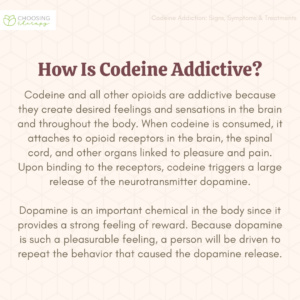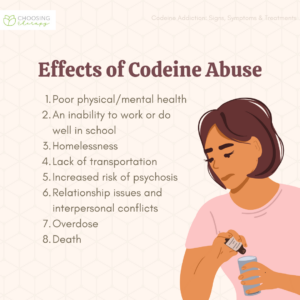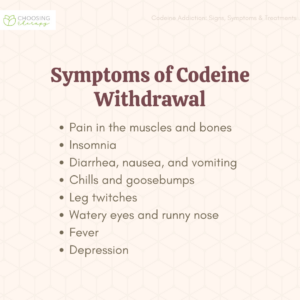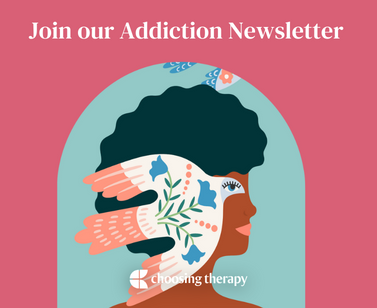Codeine is a widely-prescribed medication used to treat pain and dry cough. Though the prescription opioid is usually safe and effective when used as directed, it can become addictive. Understanding the signs, symptoms, and treatments of codeine addiction can allow for prevention and responsiveness. The problem of codeine addiction is serious but treatable with proper care.
Bicycle Health: Telehealth Treatment For Opioid Use Disorder “Best For Online MAT Program For Opioid Use Disorder” (Choosing Therapy)* Bicycle Health offers therapy, support, and medication for addiction treatment (MAT). MAT offers the lowest relapse rates for opioid use disorder, helping people to stop using opioids with minimal physical discomfort. Covered by most major insurance. Visit Bicycle Health.
What to Know About Codeine
Codeine is a medication approved for prescription use in the U.S. when a person is experiencing pain or other related issues. Codeine is an opioid pain medication, which means it will act similarly to other opioids in the body.
Some examples of opioids related to codeine include:1
- Hydrocodone (Vicodin)
- Oxycodone (OxyContin, Percocet)
- Oxymorphone (Opana)
- Morphine (Kadian, Avinza)
- Fentanyl
Like other opioids, codeine is related to morphine. Codeine may also be referred to as morphine methyl ester or methyl morphine.2
Codeine is a Schedule II controlled substance, indicating that the substance is legal when used as prescribed while carrying a high level of risk. In this case, the risk is codeine addiction, tolerance, and dependence. Someone possessing or using codeine without an active prescription faces legal consequences. Selling codeine is always illegal.2
Some codeine products, like those combining codeine with aspirin or acetaminophen, may be labeled Schedule III substances.2 Still, these products pose risks.
Medically, codeine may be used for:3
- Pain relief
- Cough
- Restless leg syndrome
- Diarrhea
Some people will only be interested in the medical benefits of codeine. Others could seek to abuse the medication to experience another set of effects.
Desired effects of codeine abuse include:1,2
- Feelings of relaxation and calm
- Sleepiness
- Euphoria or feeling high
- Lowering anger or physical tension
When the drug is abused to achieve these outcomes, there is a greater chance of unwanted results, like addiction and dependence.
How Is Codeine Addictive?
Codeine and all other opioids are addictive because they create desired feelings and sensations in the brain and throughout the body. When codeine is consumed, it attaches to opioid receptors in the brain, the spinal cord, and other organs linked to pleasure and pain. Upon binding to the receptors, codeine triggers a large release of the neurotransmitter dopamine.1
Dopamine is an important chemical in the body since it provides a strong feeling of reward. Because dopamine is such a pleasurable feeling, a person will be driven to repeat the behavior that caused the dopamine release. At this point, the codeine addiction begins and progresses much like other opioid addictions. With time, this addiction could develop into a full substance use disorder that negatively influences all aspects of a person’s life, health, and well-being.
Codeine addiction differs from dependence. Where addiction affects a person’s thoughts and behaviors, dependence changes the person physiologically. Codeine dependence modifies the body’s natural balance so that the person only feels well and functions normally when the substance is in the system. When the individual is physically dependent on codeine and cuts back or stops abruptly, they are at risk for withdrawal symptoms.2
Codeine Addiction Statistics
Opioid addiction facts and statistics paint a troubling picture of drug addiction in the U.S. According to recent surveys, here are some statistics around opioid addiction: 1,3,4
- Codeine is the most commonly prescribed and used opioid
- More than 564,000 people have died from opioids since 1999
- 44 people die every day from taking prescription opioids like codeine
- As many as 6% of people using prescription opioids switch to heroin. Though this rate may sound low, it could account for millions of people each year.
Help For Addiction Ria Health: Effective, Evidence-Based Alcohol Treatment 100% Online Quickly change your relationship to alcohol with our at-home program. On average, Ria Health members reduce their BAC levels by 50% in 3 months in the program. Services are covered by many major health plans. Visit Ria Health Workit Health – Online Treatment for Opioids or Alcohol, Including Medication. Modern, personalized recovery that combines medication, a supportive community, and helpful content. Covered by many insurance plans. Currently available in FL, TX, OH, MI, and NJ. Visit Workit Health Best Drug Addiction Rehab Centers – Find the best local detox or drug rehab center covered by your health insurance. Search by location, condition, insurance, and more. Read reviews. Start Your Search
Risk Factors & Causes of Codeine Addiction
Risk factors are a set of biological, environmental, or situational stressors, and risk factors for developing an addiction may lead someone to develop a codeine addiction or substance use disorder. For codeine addiction, one of the biggest risk factors is taking and abusing the medication.
A person will be abusing codeine when they:1
- Take it too often
- Increase the dose
- Change the way it is consumed, like snorting it instead of swallowing the pill
- Use codeine that is not prescribed to them
- Use the drug for the purpose of getting high
Those using other opioids will also be at risk due to cross-addiction.
Other risk factors that may contribute to addiction include:5
- Experiencing other substance use disorders, sometimes called having an addictive personality
- Having other family members with addiction issues
- History of trauma, abuse, or neglect
- Living in unsafe environments
- Low socioeconomic status
- Having another mental health condition, like depression, anxiety, or bipolar disorder
- Experimenting with substance use earlier in life or experiencing teenage addiction
Codeine Addiction Symptoms
As codeine abuse shifts into codeine addiction or codeine dependence, the person will experience various symptoms and effects. These effects will impact all facets of the person’s life, including their behaviors, physical status, and mental health.
Behavioral symptoms of codeine abuse may include:1,5,6
- Being secretive and dishonest
- Struggling with tasks at home, school, or work
- Change in social relationships – isolating or shifting friend groups
- Loss of interest in previously enjoyed activities
- Stealing money or spending down their savings
Physical symptoms of codeine abuse may include:1,5,6
- Constipation
- Low energy and slowed movements
- Smaller pupils
- Problems with sleeping–ranging from excessive sleepiness to insomnia
- Poor self-care and reduced hygiene
- Poor coordination
- Slurred speech
- Weight loss
Cognitive and psychological symptoms of codeine abuse may include:1,5,6
- Poor memory and attention
- Mood swings with periods of extreme happiness and irritability
- Lower self-esteem
- Complaining of hopelessness or pessimism
- Not caring about important issues
- Poor judgment
Effects of Codeine Abuse
Codeine abuse has no positive effect on a person’s life. With time, substance abuse leads to unwanted outcomes that hurt the individual and the people they care about.
Left untreated, codeine addiction may lead to:5,6
- Poor physical and mental health
- An inability to work or do well in school
- Homelessness
- Lack of transportation
- Increased risk of psychosis
- Relationship issues and interpersonal conflicts
- Overdose
- Death
Since codeine is available in combination with aspirin and acetaminophen, people abusing the substance could harm their liver and other organs.2
Co-Occurring Disorders With Codeine Addiction
Like other substance use disorders, codeine addiction does not often occur alone. Instead, people with codeine addiction tend to have other mental or physical health conditions. At times, codeine addiction will trigger new symptoms. Other times, codeine addiction is caused by preexisting conditions.
Common co-occurring disorders of a codeine addiction include:5
- Anxiety disorder
- Bipolar disorder
- Depressive disorders
- Post-traumatic stress disorder (PTSD)
- Attention-deficit/ hyperactivity disorder (ADHD)
- Conduct disorder
- Personality disorders, including borderline personality disorder and antisocial personality disorder
- Schizophrenia
- HIV
- Hepatitis C
Symptoms of Codeine Withdrawal
As mentioned, a person physically dependent on codeine will experience opioid withdrawal symptoms anytime use stops or the dose is quickly reduced. Withdrawal stems from the brain’s reliance on the drug. Without the drug, the established equilibrium is disrupted, and the person will be uncomfortable and distressed.
The full impact of codeine withdrawal is frequently unpredictable. However, experts attempt to forecast withdrawal intensity.
Factors considered in determining the intensity of withdrawal symptoms include:2
- How long the drug was used
- The dose and the method of use
- If it was used alone or with other substances
- The frequency of use
- The overall health of the individual
- Previous experiences with withdrawal
Symptoms of codeine withdrawal may include:1,5
- Pain in the muscles and bones
- Insomnia
- Diarrhea, nausea, and vomiting
- Chills and goosebumps
- Leg twitches
- Watery eyes and runny nose
- Fever
- Depression
A consistent symptom of opioid withdrawal is increased cravings for the drug. As the body seeks to reestablish balance, it will trigger intense urges to use more codeine.
Bicycle Health: Telehealth Treatment For Opioid Use Disorder Medically Assisted Treatment For Addiction (MAT) Same Day Prescriptions Often Available 100% Online Covered By Most Major Insurance
Signs of a Codeine Overdose
When a person takes more codeine than usual, takes it differently, or mixes it with other substances, they increase the risk of overdose. A codeine overdose overwhelms the person and slows down the basic processes of the body and brain.
Someone should seek immediate medical attention if they show signs of a codeine overdose such as:7
- Trouble breathing
- Feelings extremely drowsy
- Slowed heart rate
- Unable to respond to questions or stay awake
- Weakness
- Cold and clammy skin
- Fainting or losing consciousness
- Feeling dizzy
- Coma
- Death
Opioid overdose deaths are a major problem, and although they are currently driven by synthetic opioids, like fentanyl, codeine overdose is possible. Codeine overdoses are medical emergencies. Anytime you notice a loved one struggling after using codeine, call 9-1-1 or contact immediate medical services.
Treatment for Codeine Addiction
For codeine addiction, professionals may recommend opioid treatment consisting of a combination of medication and behavioral therapy interventions to end use and establish a recovery period. The best treatments are specifically tailored for the individual and their unique set of symptoms, stressors, supports, and strengths.8
Treatment options for codeine addiction include:1,8
Rehab
Substance use rehabilitation (rehab) is a general term for professional addiction treatment options. Rehab for codeine addiction may include a period of medical detoxification where physical health professionals work to create comfort and safety during the withdrawal process. Rehabs may be long-term or short-term, and they can involve residential care where the person lives at the rehab center for the duration of their treatment.
Intensive Outpatient Treatment
An important determination for anyone considering codeine treatment will be inpatient vs outpatient rehab. Where inpatient/ residential programs require them to live at the facility, outpatient options allow the person to live at home and engage in work or school. It is a preferred choice for people with mild symptoms and strong support.
Intensive outpatient programs (IOPs) and partial hospitalization programs (PHPs) offer more support than standard outpatient treatments. IOPs may be a few hours of treatment two or three days each week, while PHPs may be as much as six hours of treatment five days each week.
Insurance providers generally cover these intensive programs.
Therapeutic Interventions
The quest to find the right therapist can seem frustrating or overwhelming, but there are plenty of great therapists available. Effective therapists will use sound, evidence-based treatment approaches to improve symptoms and maintain a period of recovery focused on relapse prevention,
Therapy options for addressing the effects of a codeine addiction include:
- Cognitive behavioral therapy (CBT)
- Dialectical behavior therapy (DBT)
- Motivational interviewing (MI)
- Contingency management (CM)
These treatments may be used alone or in combination with each other or additional treatments. They can be effectively delivered in individual, group, or family sessions.
Medications
For some people, medications will be an essential part of treatment. During detoxification, treatment, and recovery, people with codeine addiction could use medications like:
- Methadone
- Buprenorphine
- Naltrexone
These medications interact with the opioid receptors in the body to create a stable and predictable set of effects.
Final Thoughts
At any level, codeine addiction is a serious issue that negatively affects all areas of a person’s life. Fortunately, treatment methods work well to identify and treat the problem, so anyone experiencing the effects of codeine addiction should consider professional treatments as soon as possible. It could save their life.
To help our readers take the next step in their mental health journey, Choosing Therapy has partnered with leaders in mental health and wellness. Choosing Therapy is compensated for marketing by the companies included below. Online Treatment for Opioids or Alcohol, Including Medication. Workit Health – Modern, personalized recovery that combines medication, a supportive community, and helpful content. Covered by many insurance plans. Currently available in FL, TX, OH, MI, and NJ. Visit Workit Health Alcohol Treatment – Cut Back or Quit Entirely Ria Health – Quickly change your relationship to alcohol with our at-home program. On average, members reduce their BAC levels by 50% in 3 months in the program. Services are covered by many major health plans. Visit Ria Health Drug Addiction Rehab Centers Recovery.com – Find the best local detox or drug rehab center covered by your health insurance. Search by location, condition, insurance, and more. Read reviews. Start Your Search Telehealth Treatment For Opioid Use Disorder Bicycle Health – offers therapy, support, and medication for addiction treatment (MAT). MAT offers the lowest relapse rates for opioid use disorder, helping people to stop using opioids with minimal physical discomfort. Covered by most major insurance. Visit Bicycle Health Drinking Moderation Sunnyside – Want to drink less? Sunnyside helps you ease into mindful drinking at your own pace. Think lifestyle change, not a fad diet. Develop new daily routines, so you maintain your new habits for life. Take a 3 Minute QuizAdditional Resources
Best Online Medication-Assisted Treatment Programs Online medication-assisted treatment programs are fairly new to the telehealth industry, but existing companies are expanding quickly with new programs emerging every day. It’s important to explore your options and understand the level of virtual care available so you can choose the best addiction treatment program for you.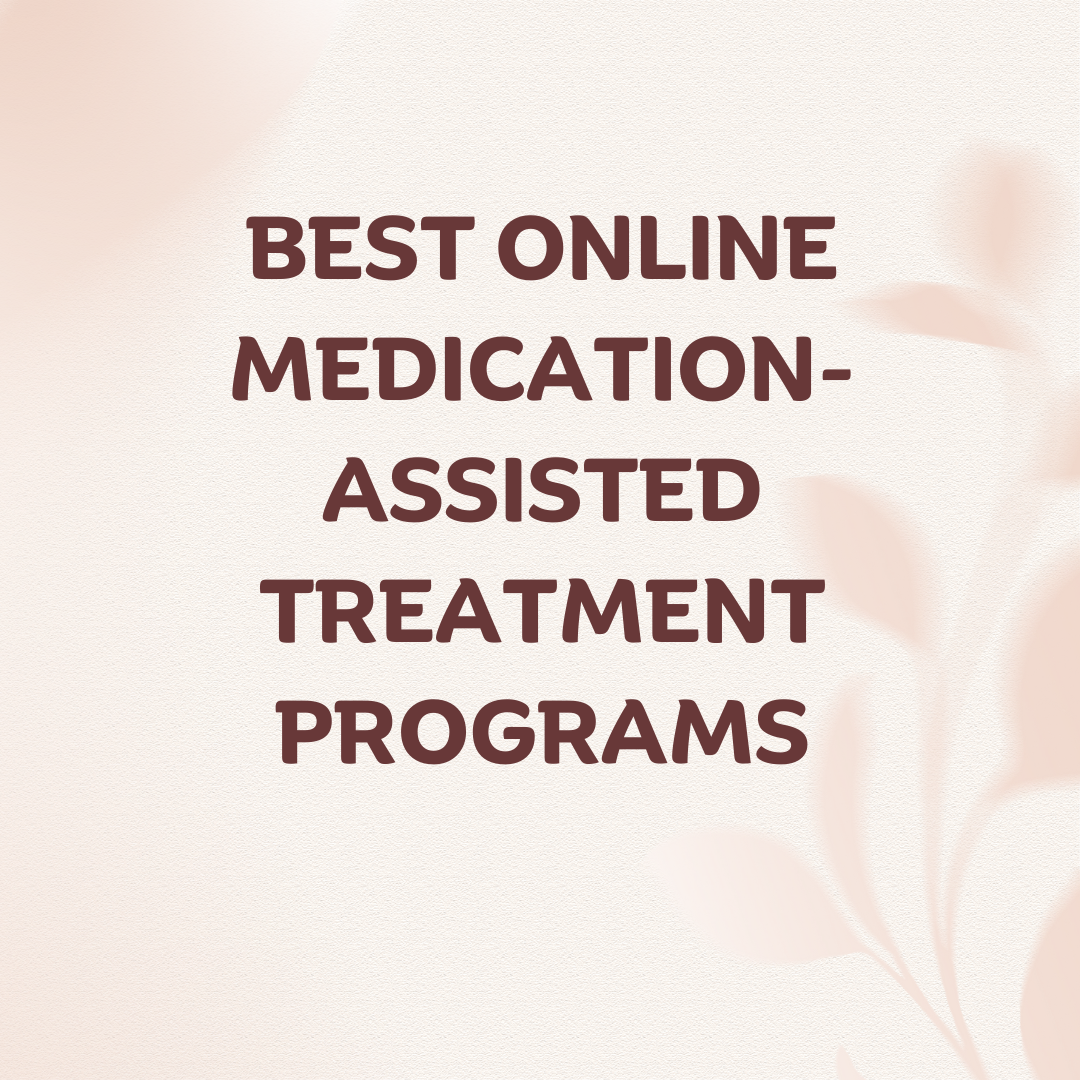
Best Mindful Drinking Apps If you’re thinking about joining the sober curious movement and you’d like to cut back on drinking, mindful drinking apps are a great place to start. Practicing mindful drinking can take some time, attention, and patience, but with the help of the right app, you can completely transform your relationship with alcohol.






